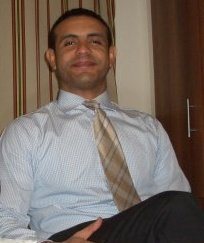Egypt’s media have been in campaign mode leading up to Monday and Tuesday’s vote. Official, quasi-official and the social media are dedicating their undivided attention to the presidential elections with reports, interviews and analyses that tackle the two candidates’ platforms, credentials and implausible promises. Yet, an Egyptian Nobel laureate and former presidential hopeful, who, respect him or despise him, helped ignite the 25 January 2011 and 30 June uprisings, is taciturn. Why aren’t the Egyptian media interviewing him?
Official media and its ancillary, quasi-official and private media in Egypt are in full swing promoting the legitimacy of the 26-27 May presidential ballot vote. Moderators, pundits and policy wonks are highlighting the significance of the elections to the country’s stability and security. The military establishment’s candidate has been receiving the widest attention, not only with multiple-parts interviews that last for hours, but also with praise and compliments by both military experts and laymen who tout in round-the-clock interviews his ingenuity and dedication to the country, while parroting his inevitability to the country’s safekeeping and advancement. Various interviews on both the Egyptian and Arab media are hosting Field Marshal Al-Sisi’s supporters, campaign managers and colleagues, with the exception of Al-Jazeera channels and its multiple platforms. They, until this moment, offer an alternative perspective to Egypt’s traditional narrative, by interviewing Muslim Brotherhood supporters and provide a venue for another side of the official story. And as the official media has stigmatised all Brotherhood members, aficionados and sympathisers as terrorists, they have no access to the Egyptian media and are still relying on challenging the state through social media, the pulpit and in their daily nightly protests.
One politician, though, who is unequivocally neither a Brotherhood member nor supporter, has been widely forgotten, stigmatised and tarnished as a traitor, infidel and antagonistic towards his country. He is Egypt’s former Vice President for International Affairs, Dr Mohamed ElBaradei, who had held the post for one month (officially sworn in on 14 July and tendered his resignation on August 14, the same day of the massacres of Rabaa Al-Adaweya and Al-Nahda squares). Why is ElBaradei reticent? What is he afraid of? Is his silence analogous to his support of the military establishment’s roadmap? What are his views on Egypt’s presidential elections? Is he endorsing either of the two-candidates? Did he vote as an expat in last week’s elections, as did 318,000 Egyptians living abroad? All of the foregoing queries are never asked in the Egyptian nor Arab media. ElBaradei who castigated two former presidential reigns and was indispensable in the army’s takeover of the helm on 3 July, is paradoxically and uncannily nonexistent on the mediascape. While others, including Mona Al Beheiri, known for her “shut up your mouse, Obama” diatribe, are considered pundits, and she has just been invited to the Arab Media Forum in Dubai as a political icon of the Egyptian public sphere.
On 18 February 2010, from his private residence in Vienna, ElBaradei was lengthily interviewed by one of Egypt’s most vocal media personalities, Amr Adeeb, on Orbit Channel, which is an Arab owned, yet administered by Egyptians and aired from the Egyptian Media Production City (EMPC) in Cairo. In this hours-lasting interview, ElBaradei lambasted the Mubarak’s regime and called for change that would take place one year later. He challenged the status quo and with his stuttering, yet, bona fide demeanor, promised that he would work towards a peaceful transition in Egypt upon his return to Cairo. The promise was to realise precisely one year after the broadcast of his interview on 20 February, which broke all proverbial barriers and poised him as the main challenger to the Mubarkian regime. His words were unequivocally terse and unambiguous: “I am not afraid, and I will return to Egypt to try changing my country to a better place which it indisputably deserves”. His determination, genuineness and efficacy have inspired millions of youth to join his cause and believe in peaceful change, even if it seemed inconceivable at the height and might of Mubarak’s power. His courageousness has prompted Mubarak to answer a question about ElBaradei while visiting Berlin for talks with the German Chancellor Angela Merkel on the 3 of April 2010. Mubarak exclaimed that ElBaradei has the prerogative, like all Egyptians, to run for the 2011 presidential elections and that Egypt has its fair share of heroes. Conversely, Al-Sisi has never been asked about ElBaradei, neither by the Egyptian, Arab nor international media in his hours-long interviews. Does that mean that all Egyptian and Arab journalists forgot Egypt’s VP and his 14 August 2013 resignation which has stained the so-called roadmap?
Why then is ElBaradei afraid now? Why isn’t he challenging the reemergence of the Mubarakian methods and what impedes him from speaking out against the brutality of the state in dealing with its dissidents and prisoners of conscience? And why aren’t the media scrambling to interview the former VP, like they do in interviewing the former prime ministers, ministers and other bureaucrats? Scattered stories are mentioning his intermittent tweets which prove that he is following the Egyptian mediascape and attending to the recent political upheaval, alas, with caginess and incomprehensible nonchalance. The role of the media is not to follow the shepherd and toe the official line and its rhetoric, yet, a discerning journalist, media channel or popular program ought to investigate what is shadowed and indecipherable. ElBaradei has been in public life for many decades, and his legacy as a freedom-fighter won’t only be shaped and crystallised as one-among-millions in deposing Mubarak, the person, but by toppling, Mubarak, the system and the mentality. Until this happens, ElBaradei needs to be extensively interviewed by the media sans redlines and scripted questions, and the fear that is still shunning our public sphere, won’t disappear unless there are media that delve into the known unknowns of the official discourse. Until then, the malaise of the status quo will remain, regrettably, for a very long time.



